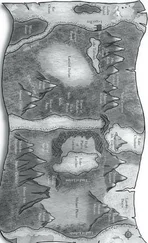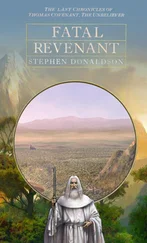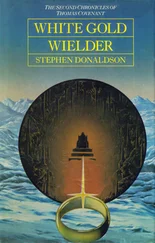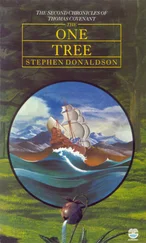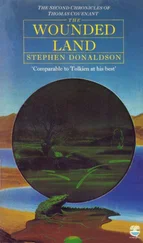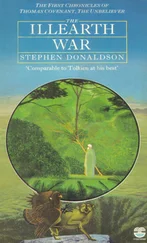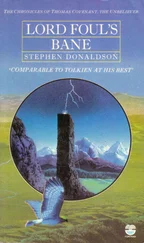“Then First Mark Banner and Terrel and Runnik of the Bloodguard went to do battle with the three. They slew Korik and Sill and Doar their comrades, and brought their bodies to the Keep. In that way, we found”- Mhoram swallowed thickly-“we found that Lord Foul had cut off the last two fingers from the right hand of each of the three.”
Covenant cried out in pain, but Mhoram drove his point home hoarsely. “He damaged each Bloodguard to resemble you.”
“Stop!” Covenant groaned. “Stop. I can’t stand it.”
Still the High Lord continued. “When First Mark Banner saw how Korik and his comrades had been corrupted despite their Vow, he and all the Bloodguard abandoned their service. They returned to the mountain home of the Haruchai . He said that they had been conquered by Corruption, and could no longer serve any Vow.
“My friend, without them-without the Staff of Law-without any immense army or dour-handed allies-we will surely fall. Only the wild magic can now come between us and Lord Foul’s hunger.”
As Mhoram finished, Covenant’s eyes looked as bleak as a wilderland. The heat of his fever seemed to make any tears impossible. His resistance sagged briefly, and for an instant he almost allowed his translation into the Close to be completed. But then he raised his head to look at other memories. His refusal stiffened; he moved back until he almost vanished in the bright graveling light. “Mhoram, I can’t,” he said as distantly as if he were choking. “I can’t. The snake-That little girl is all alone. I’m responsible for her. There’s no one to help the child but me.”
From high in the opposite gallery, Mhoram felt a surge of anger as Quaan’s old indignation at Covenant flared into speech. “By the Seven!” he barked. “He speaks of responsibility.” Quaan had watched himself become old and helpless to save the Land, while Covenant neither aged nor acted, He spoke with a warrior’s sense of death, a warrior’s sense of the value in sacrificing a few lives to save many. “Covenant, you are responsible for us!”
The Unbeliever suffered under Quaan’s voice as he did under Mhoram’s, but he did not turn to face the Warmark. He met Mhoram’s gaze painfully and answered, “Yes, I know. I know. I am-responsible.
But she needs me. There’s no one else. She’s part of my world, my real world. You’re-not so real now. I can’t give you anything now.” His face twisted frantically, and his resistance mounted until it poured from him like agony. “Mhoram, if I don’t get back to her she is going to die.”
The desolate passion of Covenant’s appeal wrung Mhoram. Unconsciously, he gnawed his lips, trying to control with physical pain the strain of his conflicting compassions. His whole life, all his long commitments, seemed rent within him. His love for the Land urged him to deny the Unbeliever, to struggle now as if he were wrestling for possession of Covenant’s soul. But from the same wellspring of his self arose an opposite urge, a refusal to derogate Covenant’s sovereignty, Covenant’s right to choose his own fate. For a time, the High Lord hesitated, trapped in the contradiction. Then slowly he lifted his head and spoke to the people in the Close as well as to Thomas Covenant.
“No one may be compelled to fight the Despiser. He is resisted willingly, or not at all. Unbeliever, I release you. You turn from us to save life in your own world. We will not be undone by such motives. And if darkness should fall upon us, still the beauty of the Land endures. If we are a dream-and you the dreamer-then the Land is imperishable, for you will not forget.
“Be not afraid, ur-lord Thomas Covenant. Go in Peace.”
He felt a pressure of protest from Lord Loerya and some of the other spectators, but he overruled them with a commanding gesture. One by one, the Lords withdrew the power of their staffs while Tohrm lowered the graveling fire. Covenant began to fade as if he were dissolving in the abyss beyond the arch of Time.
Then High Lord Mhoram recollected his promise to reveal the secret of the wild magic. He did not know whether or not Covenant could still hear him, but he whispered after the fading form, “You are the white gold.”
A moment later, he knew that the Unbeliever was gone. All sense of resistance and power had left the air, and the light of the graveling had declined to a more normal level. For the first time since the summoning began, Mhoram saw the shapes and faces of the people around him. But the sight did not last. Tears blinded him, and he leaned weakly on his staff as if only its stern wood could uphold him.
He was full of grief over the strange ease with which he had summoned the Unbeliever. Without the Staff of Law, he should not have been able to call Covenant alone; yet he had succeeded. He knew why. Covenant had been so vulnerable to the summons because he was dying.
Through his sorrow, he heard Trevor say, “High Lord-the krill - the gem of the krill came to life. It burned as it did when the Unbeliever first placed it within the table.”
Mhoram blinked back his tears. Leaning heavily on his staff, he moved to the table. In its centre, Loric’s krill stood like a dead cross-as opaque and fireless as if it had lost all possibility of light. A rage of grief came over Mhoram. With one hand, he grasped the hilt of the silver sword.
A fleeting blue gleam flickered across its gem, then vanished.
“It has no life now,” he said dully.
Then he left the Close and went to the sacred enclosure to sing for Covenant and Callindrill and the Land.
A cold wind blew through Covenant’s soul as he struggled up out of the rock. It chilled him as if the marrow of his bones had been laid bare to an exhalation of cruel ice-cruel and sardonic, tinged with that faint yet bottomless green travail which was the antithesis of green things growing. But slowly it left him, slid away into another dimension. He became more conscious of the stone. Its granite impenetrability thickened around him; he began to feel that he was suffocating.
He flailed his arms and legs, tried to reach toward the surface. But for a time he could not even be sure that his limbs were moving. Then a series of jolts began to hurt his joints. He sensed through his elbows and knees that he was thrashing against something hard.
He was pounding his arms and legs at the hillside. Behind the muffled thuds and slaps he made, he could hear running water. The sun shone objectively somewhere beyond him. He jerked up his head.
At first, he could not orient himself. A stream splashed vividly across his sight; he felt that he was peering at it from above, that the slope down which it ran was canted impossibly under him. But at last he realized that he was not looking downward. He lay horizontally across the slope. The hill rose above him on the right, dropped away on the left.
He turned his head to search for the girl and the snake.
His eyes refused to focus. Something pale gleamed in front of his face, prevented him from seeing down the hill.
A thin, childish voice near him said, “Mister? Are you okay, mister? You fell down,”
He was trying to see too far away. With an effort, he screwed his gaze closer, and at last found himself staring from a distance of a few inches at a bare shin. In the sunlight, it gleamed as pure and pale as if it had been anointed with chrism. But already it showed a slight swelling. And in the centre of the swelling were two small red marks like paired pinpricks.
“Mister?” the child said again. “Are you okay? The snake bit me. My leg hurts.”
The frigid winter he had left behind seemed to leap at him from the depths of his mind. He began to shiver. But he forced himself to disregard the cold, bent all his attention toward those two red fang marks. Without taking his eyes off them, he climbed into a sitting position. His bruises groaned at him, and his forehead throbbed sickly, but he ignored all the pain, discounted it as if it had nothing to do with him. His trembling hands drew the little girl toward him.
Читать дальше
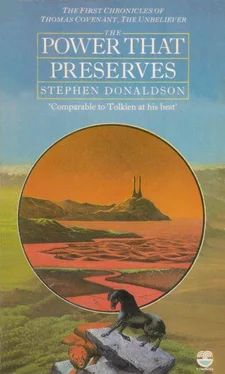
![Сьюзан Кейн - Quiet [The Power of Introverts in a World That Can't Stop Talking]](/books/33084/syuzan-kejn-quiet-the-power-of-introverts-in-a-wo-thumb.webp)
